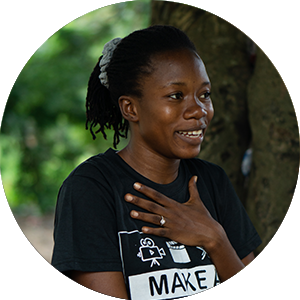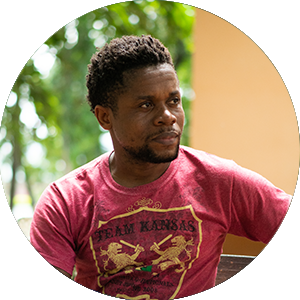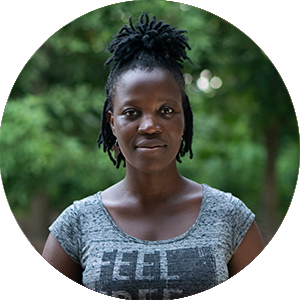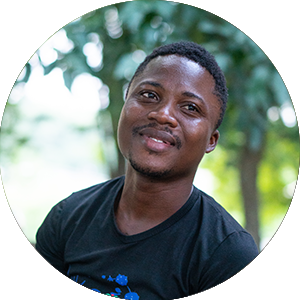All project participants bring their own life stories with them — with personal experiences and cultural views that couldn’t be more diverse. Let us introduce you to a few.
ALEX ASARE, 30
TRAINEE FROM GHANA
FROM THE STREET TO THE FILM STUDIO

When Alex first arrived in Kumasi, he was only twelve. Motivated by a desire for a better future, the young filmmaker had left his parents’ house in northern Ghana and made his way towards the big city — alone and on foot. On the way, he slept under cars and made a little money polishing shoes.
>/br>
“I had it a bit hard as a kid” — that’s Alex’s understated summary. He says the most important day of his life was the day he could finally afford a school uniform. Night shifts at a restaurant are how the Ghanaian managed to pay for his schooling. He taught himself to edit film by observing a friend at work in the industry. When he came across the opportunity to become a WELTFILME trainee — to participate in the MAKE A DIFFERENCE project and learn the foundations of filmmaking from professionals — Alex didn’t have to think twice before applying.
Since then, Alex has started his own photography and videography business, where he employs two other people.
>/br>
He used to dream about graduating high school. “Now,” he says with a wink and a smile that lights up his whole face, “my greatest dream is to shoot a Hollywood film!”
ALEX ASARE, 30
TRAINEE FROM GHANA
FROM THE STREET TO THE FILM STUDIO

When Alex first arrived in Kumasi, he was only twelve. Motivated by a desire for a better future, the young filmmaker had left his parents’ house in northern Ghana and made his way towards the big city — alone and on foot. On the way, he slept under cars and made a little money polishing shoes.
>/br>
“I had it a bit hard as a kid” — that’s Alex’s understated summary. He says the most important day of his life was the day he could finally afford a school uniform. Night shifts at a restaurant are how the Ghanaian managed to pay for his schooling. He taught himself to edit film by observing a friend at work in the industry. When he came across the opportunity to become a WELTFILME trainee — to participate in the MAKE A DIFFERENCE project and learn the foundations of filmmaking from professionals — Alex didn’t have to think twice before applying.
>/br>
Since then, Alex has started his own photography and videography business, where he employs two other people.
>/br>
He used to dream about graduating high school. “Now,” he says with a wink and a smile that lights up his whole face, “my greatest dream is to shoot a Hollywood film!”
FATOU NDURE, 25
TRAINEE FROM THE GAMBIA
A DREAM COME TRUE AND A SECOND FAMILY

Fatou almost didn’t make it to the workshop at all. She had only learned that something like WELTFILME even existed a mere two days before the application deadline — by chance, from a friend’s WhatsApp status. She knew at once she had to seize the opportunity.
In The Gambia, Fatou studies architecture, but it isn’t her great passion. “I’ve always wanted to be a filmmaker, ever since I was a child,” she explains. But her home country offered no such opportunity; there are no film schools in the West African nation of The Gambia.
Thanks to WELTFILME and the MAKE A DIFFERENCE project, Fatou is a bit closer to her dream career. She has high praise for the programme: “Rogier and Frank are amazing teachers. They taught us three years’ worth of film school in two days.”
On a personal level, participating in the multi-week workshop in Ghana was something very special for Fatou. This emerging filmmaker returns to The Gambia not only with a great deal of new knowledge about cinematography, editing, and screenwriting, but also with friendships that transcend national borders. “I feel like I’ve found a family,” she reflects. And hopefully, she says, she’ll be able to return next year — maybe even as a trainer herself.
FATOU NDURE, 25
TRAINEE FROM THE GAMBIA
A DREAM COME TRUE AND A SECOND FAMILY

Fatou almost didn’t make it to the workshop at all. She had only learned that something like WELTFILME even existed a mere two days before the application deadline — by chance, from a friend’s WhatsApp status. She knew at once she had to seize the opportunity.
In The Gambia, Fatou studies architecture, but it isn’t her great passion. “I’ve always wanted to be a filmmaker, ever since I was a child,” she explains. But her home country offered no such opportunity; there are no film schools in the West African nation of The Gambia.
Thanks to WELTFILME and the MAKE A DIFFERENCE project, Fatou is a bit closer to her dream career. She has high praise for the programme: “Rogier and Frank are amazing teachers. They taught us three years’ worth of film school in two days.”
On a personal level, participating in the multi-week workshop in Ghana was something very special for Fatou. This emerging filmmaker returns to The Gambia not only with a great deal of new knowledge about cinematography, editing, and screenwriting, but also with friendships that transcend national borders. “I feel like I’ve found a family,” she reflects. And hopefully, she says, she’ll be able to return next year — maybe even as a trainer herself.
LUTHER N. MAFALLEH, 36
TRAINER FROM LIBERIA
CHANGING THE WORLD WITH FILM

Luther wasn’t actually all that interested in film. The fact that this 36-year-old Liberian is nevertheless attending what is already his third WELTFILME workshop has more to do with his professional background in developmental aid. He sees film and television as powerful tools for drawing the public’s attention to important social issues.
>/br>
Many young people in Luther’s home country, Liberia, are hardly aware of how people are making meaningful change in their societies. Luther wants to fix that. Following WELTFILME’s example, he now conducts his own independent film workshops with a specific goal — to show other young people how film can actually make a difference.
Luther thanks the organisers from Germany for these new opportunities: “WELTFILME has opened doors for me that I didn’t even know existed,” he says with a laugh.
>/br>
The first big film project Luther is taking on, together with his team in Liberia, is a documentary on human trafficking. It certainly won’t be his last project, either. As Luther puts it: “Every one of us has a story to tell.”
LUTHER N. MAFALLEH, 36
TRAINER FROM LIBERIA
CHANGING THE WORLD WITH FILM

Luther wasn’t actually all that interested in film. The fact that this 36-year-old Liberian is nevertheless attending what is already his third WELTFILME workshop has more to do with his professional background in developmental aid. He sees film and television as powerful tools for drawing the public’s attention to important social issues.
>/br>
Many young people in Luther’s home country, Liberia, are hardly aware of how people are making meaningful change in their societies. Luther wants to fix that. Following WELTFILME’s example, he now conducts his own independent film workshops with a specific goal — to show other young people how film can actually make a difference.
>/br>
Luther thanks the organisers from Germany for these new opportunities: “WELTFILME has opened doors for me that I didn’t even know existed,” he says with a laugh.
>/br>
The first big film project Luther is taking on, together with his team in Liberia, is a documentary on human trafficking. It certainly won’t be his last project, either. As Luther puts it: “Every one of us has a story to tell.”
MATILDA DOGBATSEY, 30
TRAINER FROM GHANA
EQUAL OPPORTUNITIES FOR ALL

Creativity and business sense are in Maltida’s blood. Before turning to film, the Ghanaian had already worked more than five years as a freelance photographer. An impressive achievement — especially for a young woman in West Africa. “It’s certainly harder for women to gain recognition for their accomplishments,” Matilda explains, adding: “I have to work twice as hard as a man in order to be taken seriously.”
In the courses organised by WELTFILME, things are different. Everyone is treated equally. “Everyone has a positive, open mindset,” according to Matilda.
Today, Matilda can verify her skillset with a WELTFILME certificate. It has already helped her land a number of assignments, including several documentary films she shot for relief organisations in northern Ghana. Despite her many successes, Matilda remains humble. She absolutely wants to take part in additional WELTFILME workshops and master classes, and she’s excited to learn as much as she can. Her major goal, aside from her career, is to be a role model for young girls.
MATILDA DOGBATSEY, 30
TRAINER FROM GHANA
EQUAL OPPORTUNITIES FOR ALL

Creativity and business sense are in Maltida’s blood. Before turning to film, the Ghanaian had already worked more than five years as a freelance photographer. An impressive achievement — especially for a young woman in West Africa. “It’s certainly harder for women to gain recognition for their accomplishments,” Matilda explains, adding: “I have to work twice as hard as a man in order to be taken seriously.”
In the courses organised by WELTFILME, things are different. Everyone is treated equally. “Everyone has a positive, open mindset,” according to Matilda.
Today, Matilda can verify her skillset with a WELTFILME certificate. It has already helped her land a number of assignments, including several documentary films she shot for relief organisations in northern Ghana. Despite her many successes, Matilda remains humble. She absolutely wants to take part in additional WELTFILME workshops and master classes, and she’s excited to learn as much as she can. Her major goal, aside from her career, is to be a role model for young girls.
MAHZOUBA MAYA FAAL, 20
TRAINEE FROM THE GAMBIA
LEARNING FOR LIFE

“I’ve been lucky,” Maya states with a sober look. She’s talking about the luck to grow up as the daughter of open-minded, modern academics who not only enabled her to study journalism, but also allowed her to travel to Ghana to train with WELTFILME.
>/br>
An education, a career, the opportunity to forge your own path—for many young women in Maya’s home country of The Gambia, such things are just a dream. In this West African state, it’s still typical for girls as young as 15 or 16 years old to be married.
Maya is 20, and at the moment she’s not thinking about getting married and starting a family. She wants to focus on filmmaking for the next few years. WELTFILME gave her the tools she needs to do so. With practical training by the German crew, now this emerging journalist can show the whole world what moves people in her home country. For example, Maya has a YouTube channel where she likes to upload documentary footage.
>/br>
Maya’s eyes sparkle when she talks about her future plans. “There are a lot of stories in The Gambia that haven’t been told.” But that’s sure to change, thanks to young, ambitious filmmakers like Maya.
MAHZOUBA MAYA FAAL, 20
TRAINEE FROM THE GAMBIA
LEARNING FOR LIFE

“I’ve been lucky,” Maya states with a sober look. She’s talking about the luck to grow up as the daughter of open-minded, modern academics who not only enabled her to study journalism, but also allowed her to travel to Ghana to train with WELTFILME.
>/br>
An education, a career, the opportunity to forge your own path—for many young women in Maya’s home country of The Gambia, such things are just a dream. In this West African state, it’s still typical for girls as young as 15 or 16 years old to be married.
>/br>
Maya is 20, and at the moment she’s not thinking about getting married and starting a family. She wants to focus on filmmaking for the next few years. WELTFILME gave her the tools she needs to do so. With practical training by the German crew, now this emerging journalist can show the whole world what moves people in her home country. For example, Maya has a YouTube channel where she likes to upload documentary footage.
>/br>
Maya’s eyes sparkle when she talks about her future plans. “There are a lot of stories in The Gambia that haven’t been told.” But that’s sure to change, thanks to young, ambitious filmmakers like Maya.
G-OTHELLO ZORDYO, 26
TRAINEE FROM LIBERIA
FINALLY, FILMS FROM HOME

Othello sits on a shaded bench before the gates of the YMCA building in Koforidua, Ghana, with his legs crossed nonchalantly.
“Of course, we’re all Africans, but Ghana is very different than Liberia,” says Othello, who’s taking part in his second WELTFILME workshop in Ghana. In Liberia, you can’t make a living from film. There are only a few TV stations, no local film industry, and, above all, no training opportunities for young people who want to learn the craft of filmmaking.
All the more reason Othello finds WELTFILME’s work so important. The emerging filmmaker plans to take the knowledge he’s gained over the course of both workshops in Ghana back to his home country. With the help of other trainees, he’s in the process of putting together a training team that can offer film courses in Liberia on the basis of WELTFILME’s model.
After all, he knows that it’s up to him to improve the situation in his home country. “Liberians love film. Why should they only see productions from other countries?” he asks, his eyes glistening — great things lie ahead.
G-OTHELLO ZORDYO, 26
TRAINEE FROM LIBERIA
FINALLY, FILMS FROM HOME

Othello sits on a shaded bench before the gates of the YMCA building in Koforidua, Ghana, with his legs crossed nonchalantly.
“Of course, we’re all Africans, but Ghana is very different than Liberia,” says Othello, who’s taking part in his second WELTFILME workshop in Ghana. In Liberia, you can’t make a living from film. There are only a few TV stations, no local film industry, and, above all, no training opportunities for young people who want to learn the craft of filmmaking.
All the more reason Othello finds WELTFILME’s work so important. The emerging filmmaker plans to take the knowledge he’s gained over the course of both workshops in Ghana back to his home country. With the help of other trainees, he’s in the process of putting together a training team that can offer film courses in Liberia on the basis of WELTFILME’s model.
After all, he knows that it’s up to him to improve the situation in his home country. “Liberians love film. Why should they only see productions from other countries?” he asks, his eyes glistening — great things lie ahead.

